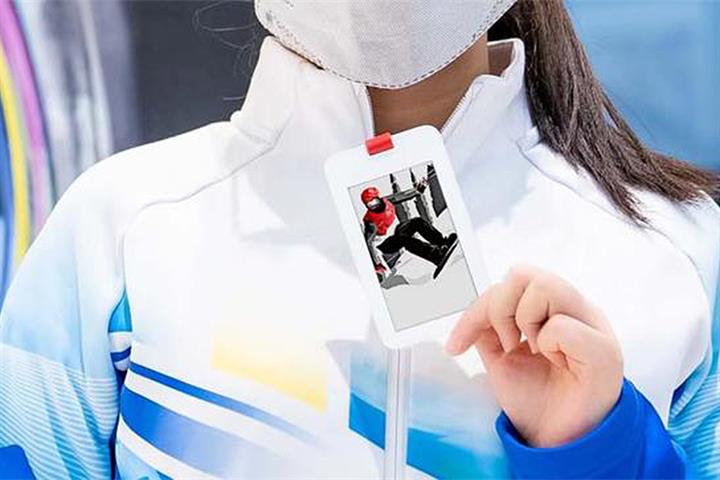 Beijing Winter Olympics Shows Off Latest IoT Tech
Beijing Winter Olympics Shows Off Latest IoT Tech(Yicai Global) Feb. 7 -- Used in smart, convenient, and environmentally friendly applications such as volunteer ID cards, Internet of Things technologies are racing ahead at the Beijing 2022 Winter Olympics.
Volunteers are wearing digital ID cards in the athlete’s village, marking the debut of such an application at a world-class winter sports event. The card, with a 3.7-inch e-ink display, is powered by an artificial intelligence algorithm independently developed by BOE Technology Group, allowing free edits and a combination of pictures and text via a dedicated mobile app.
The recyclable e-card has no built-in battery, is wirelessly chargeable and it can have real-time information updates, Yicai Global learned.
Watching and livestreaming ice and snow events is demanding on lighting systems as there is a large area to cover, said Yao Mengming, general manger of Signify China's lighting design division, adding that the climate is complex and the surroundings are mostly white. Signify China is providing interconnected lighting systems for Beijing 2022's stadiums.
The lighting system can avoid the need for lots of manual field maintenance and makes it possible to spot potential problems in automated pre-match checks. The stadiums can also have different lighting schemes for different stages of events such as matches and medal ceremonies, and less power is used in post-event maintenance.
Chinese home appliances giant Midea Group renovated the aircon system of the Beijing National Stadium, also known as the ‘Bird's Nest.’ Events can take place at the venue in 160 days of a whole year, and the stadium can have different temperatures in different spaces, Luo Bin, general manager of fluorine machine products at Midea’s HVAC and building technologies division, told Yicai Global.
In Beijing, the lowest temperature in winter can reach minus 20 degrees Celsius, and the temperature in summer can reach 37C. The renovation enables the Bird's Nest's aircon system to adjust operational modes for single or multiple units, boosting energy efficiency by as much as 40 percent. The system also allows for varied temperature and humidity control requirements for different areas and equipment.
Meanwhile, Zhuhai-based home appliances giant Gree Electric has found a way to overcome difficulties in providing accurate temperature control. The Beijing National Aquatics Centre, also known as the ‘Water Cube,’ serves as the venue for curling matches, which require different temperatures for the ice surface, the competitors’ area, and the spectator area.
Gree solved the challenge by equipping the Water Cube with three low-temperature air cooled units that integrate hydraulic modules, group control devices and other smart tech.
Editors: Xu Wei, Tom Litting